- Home
- Julie Smith
Dead In The Water (Rebecca Schwartz Mystery #4) (The Rebecca Schwartz Series)
Dead In The Water (Rebecca Schwartz Mystery #4) (The Rebecca Schwartz Series) Read online
Praise for DEAD IN THE WATER, the FOURTH book in the Rebecca Schwartz series by Edgar-winning author Julie Smith:
“If you haven't discovered Smith yet, now is the time to do so… Move over, Sara Paretsky.”
—KPFA-FM (Berkeley, CA)
“Nobody gets inside her characters like Julie Smith.”
—Linda Barnes, author of
the Carlotta Carlyle series
“Smith is a gifted writer.”
—THE WASHINGTON POST BOOK WORLD
“Julie Smith writes like jazz should sound—cool, complex, and penetrating right to the heart.”
—Val McDermid, best-selling author
of the Tony Hill series
DEAD IN THE WATER is the FOURTH Rebecca Schwartz Mystery.
The Rebecca Schwartz Series
DEATH TURNS A TRICK
THE SOURDOUGH WARS
TOURIST TRAP
DEAD IN THE WATER
OTHER PEOPLE’S SKELETONS
Also by Julie Smith:
The Skip Langdon Series
NEW ORLEANS MOURNING
THE AXEMAN’S JAZZ
JAZZ FUNERAL
DEATH BEFORE FACEBOOK
(formerly NEW ORLEANS BEAT)
HOUSE OF BLUES
THE KINDNESS OF STRANGERS
CRESCENT CITY CONNECTION
(formerly CRESCENT CITY KILL)
82 DESIRE
MEAN WOMAN BLUES
The Paul Mcdonald Series
TRUE-LIFE ADVENTURE
HUCKLEBERRY FIEND
The Talba Wallis Series
LOUISIANA HOTSHOT
LOUISIANA BIGSHOT
LOUISIANA LAMENT
P.I. ON A HOT TIN ROOF
As Well As
WRITING YOUR WAY: THE GREAT AMERICAN NOVEL TRACK
NEW ORLEANS NOIR (ed.)
DEAD IN THE WATER
A Rebecca Schwartz Mystery
By
JULIE SMITH
booksBnimble Publishing
New Orleans, La.
Dead in the Water
Copyright 1991 by Julie Smith
All rights are reserved. No part of this book may be used or reproduced in any manner whatsoever without written permission, except in the case of brief quotations embodied in critical articles and reviews.
Cover by Nevada Barr
ISBN: 9781617507946
Originally published by Ballantine Books, December 1991
www.booksbnimble.com
First booksBnimble Publishing electronic publication: October 2012
eBook editions by eBooks by Barb for booknook.biz
Contents
Praise
The Rebecca Schwartz Series
Also by Julie Smith
Epigraph
CHAPTER ONE
CHAPTER TWO
CHAPTER THREE
CHAPTER FOUR
CHAPTER FIVE
CHAPTER SIX
CHAPTER SEVEN
CHAPTER EIGHT
CHAPTER NINE
CHAPTER TEN
CHAPTER ELEVEN
CHAPTER TWELVE
CHAPTER THIRTEEN
CHAPTER FOURTEEN
CHAPTER FIFTEEN
CHAPTER SIXTEEN
CHAPTER SEVENTEEN
CHAPTER EIGHTEEN
CHAPTER NINETEEN
CHAPTER TWENTY
CHAPTER TWENTY-ONE
CHAPTER TWENTY-TWO
Sign Up...
Guarantee
The Rebecca Schwartz Series
Also by Julie Smith
Acknowledgments
About the Author
DEDICATION
For Aliza P. Rood, a friend of the sea otter
It was one of those days in Monterey when the air is washed and polished like a lens. The sunshine had a goldy look and the red geraniums burned the air around them. The delphiniums were like little openings in the sky. There aren’t many days like that anyplace.
—John Steinbeck, Sweet Thursday
CHAPTER ONE
Sometimes in the life of a lawyer (even one as dedicated as I), there comes an overpowering urge to be under the sea, not so much in an octopus’s garden as in a hermit crab’s.
I indulge this fantasy vicariously, by keeping a one-hundred-gallon saltwater aquarium in my living room. A lot of people think I’m weird.
Marty Whitehead was weird, too.
It was late August when she called that last time, and I was staring out my office window thinking how odd it was to feel so empty and sad on such a beautiful day. I didn’t want to make nice over lunch. I wanted to hole up like a hermit and be as crabby as I liked.
“Gosh-I’d-love-to, so-sorry, I’m-booked,” I said, or something close enough. I’d said it a lot lately and I was getting it down pat.
“Drinks then?”
“I’d really love to, but I’ve got to try this case tomorrow and I could probably be ready sometime in October if I worked every minute. One of those things, maybe next time …”
“Oh.” Her voice was low and gave nothing away, but something didn’t feel right.
“Marty, is anything wrong?”
“No, I’m fine. Well, I guess you should know, but it’s all right, I’m coping just fine. Don’s dumped me, but it’s okay. Really.”
Rob Burns hadn’t dumped me, exactly, but it was our relationship that had me in the dumps, and you know what they say about misery. I had the damn drink with her.
* * *
My true love had gotten a Nieman Fellowship and had already left for Cambridge to find an apartment. I knew that Nieman Fellows returned from Harvard after a year; and that, like anyone else in this great country, they were free to receive visitors during their year. And I knew that a Nieman was about as prestigious as anything in journalism and that this was the high point of Rob’s career. So why was I so sad?
Because I knew it was over, that’s why. Rob didn’t know, but I did. I wasn’t sure what the problem was, exactly. The easy explanation was that I felt he cared more about his job than he did about me. He was a reporter for the Chronicle—a workaholic who could forget dates and cancel weekends when he was on a good story. But I had a nagging feeling that was only an explanation of convenience.
There was my half to think about, too. I found myself more and more haunted by ugly questions, questions like “What’s wrong with me?” Or worse: “Am I really so unlovable his job looks better?”
Since I like to think of myself as an independent, capable, Twenty-First-Century kind of woman, these clingy thoughts, so suggestive of poor self-esteem and emotional dependency, weren’t comfortable, to say the least—even buried deep, which was where I carried them. You bet I kept them deep. No Rob Burns or anybody else was going to view the spectacle of Rebecca Schwartz begging and nagging.
After two years of the same old setup, I had to conclude that, for whatever reason—something about me, something about him, something about both of us—Rob wasn’t really working out.
It was going to be an awful wrench. If anything, the Nieman made the whole thing easier, because he’d be gone in a natural way while I got used to the idea—but not having him around was going to be hard as hell. It already was. He’d only been gone a week and I was moping about so unproductively that Chris Nicholson, my law partner, was begging me to take a vacation and make it official. My sister Mickey, able to tell by my eyebags how badly I was sleeping, had shown her concern by giving me some Seconal prescribed for her after a miscarriage.
Our smart-aleck secretary, A
lan Kruzick, had hung the office in black the day before Marty called—you’d have thought it was someone’s fortieth birthday. Kruzick, one of The King’s most loyal subjects, had an Elvis song for every occasion. His favorite trick was to greet me with the song of the day, flipping the switch when I walked in. The day of the black office, it was “Heartbreak Hotel.” Normally I would simply have picked up the nearest chair and heaved it at him. That day I broke into tears.
So I was easy prey for Marty. She was someone who’d be so busy crying in her own beer, she wouldn’t mind if I did the same. In fact, she was so much worse off than I was that I could almost forget my own troubles. I didn’t for an instant buy that “really okay” garbage.
We’d met at a party. “Marty,” said our host, “has an aquarium even bigger than yours.”
“Saltwater?” I’d asked her.
“Uh-huh.”
Already I liked this woman. Saltwater aquariums are much rarer and tougher to maintain than freshwater ones. “How many gallons?”
“Let’s see. Nearly three-quarters of a million, I think—if you count all three tanks.”
Our host, I saw, had been putting me on. This was no living room fishbowl we were speaking of. “You must live in Monterey,” I said.
“Yes. I’m marketing director at the aquarium.”
The Monterey Bay Aquarium is one of the wonders of the world. I was momentarily filled with envy.
“How marvelous!” I blurted. “And how are ‘the lovely animals of the sea, the sponges, tunicates, anemones, the stars and buttlestars, and sun stars—’”
Marty took up the quote from Cannery Row “‘—the bivalves, barnacles, the worms and shells, the fabulous and multiform little brothers—’” She stopped, looking exhausted. “And so on. My favorites are the anemones.” Mine, too—Marty was making big points, but she didn’t even stop for air. “You should see what we got this week—a wonderful, funny Mola mola. It’s so ugly you want to take it home and kiss it.”
“But molas are open-ocean fish.”
She shrugged happily. “Now and then they wander into the bay, looking a little like bewildered Frisbees.”
Pleased with himself, if a little mixed-up, our host had drifted on, knowing he’d delighted a couple of aliens who’d found someone with whom to speak their native tongue.
Marty and I could have gone on about bivalves and barnacles for hours (and did for the better part of one), but our respective escorts eventually caught up with us—Rob and Marty’s husband, Don.
When the gents turned up, the conversation swung, as it often did when Rob made a new acquaintance, to why the Chronicle was such a bad newspaper. Since Rob thought it quite a good paper and adored working there, it might be imagined this was not his favorite subject. But he was infinitely good-natured about it, and even persuasive as to his own view. And so he and Don hit it off as well.
The four of us went to dinner after the party, and Marty and Don swore to have us down to Monterey for a weekend. But Don was always traveling, it seemed. Anyway, it never happened. On the other hand, Marty and I usually got together for lunch or drinks whenever she was in the city.
Now she had a dead marriage and two children—ages ten and twelve—who were sure to be as brokenhearted as she was. If you thought of the marriage as a fifteen-year investment, she also had fifteen years down the tube.
As we drank—she had white wine (quite a few glasses of it), I had red—I got the whole story, probably now in its hundred-and-ninth telling: “It was so sudden, Rebecca. There was no way to see it coming, no way to prepare.
“One day he came home and said we had to talk. I’d gotten off early and I was making vegetable soup. He said he’d fallen in love with somebody else and he was moving out.” She shrugged. “And that was that.”
“Pretty much of a shock.”
“The shock was the worst part.” She straightened her spine and stared straight ahead. “But I’m over it now.”
Sure she was.
Not knowing what to say, I let some time go by, thinking I was witnessing one of the worst cases of denial I’d seen. I’ve noticed some people cover their sadness with rage, and some, their rage with denial. Marty seemed to be in the latter class, but she’d at least gotten down to rage in one area. She said in a voice loud enough for everyone in Tosca to hear, “He didn’t even tell me who she was!”
“It was someone you knew?”
“My boss.”
Marty had a one-of-a-kind job. The family had moved to Monterey on her account, not Don’s. She might be in marketing—the least piscine of jobs at the aquarium—but she could be in marketing anywhere. She was there because she loved the sea and its wildly teeming life. She was as dedicated to that aquarium as if it were in her living room. You didn’t just walk away from a job like hers. But how could you work with a boss who had committed grand larceny in your bed?
“Sadie Stoop-Low,” said Marty, draining her glass (and listing a little, I thought).
“I beg your pardon?”
“Swedlow. Sadie Swedlow in the phone book. Bitch!”
Her sibilants were getting slushy. Some people feed their denial with alcohol. Starting to worry, I said, “You aren’t driving back tonight, are you?”
“Sure, why not?”
I devoted the next half hour to talking her out of it, five minutes to phoning her sitter, and the hour after that to nursemaid services involving more drinking and more listening. It was almost midnight before I got her bedded down in my living room, an eminently soothing place for a fish-fancier.
She awoke fresh and grateful, but a little sheepish. “Gosh, Rebecca, I don’t usually drink that much.”
“Marty, listen, something awful’s happened to you. You have a right to drown your sorrows.”
“It wasn’t that. I’m coping fine. I should have had more than a salad for dinner, that’s all. I’ve gained two pounds in the last month, and I’ve got to take it off.”
“You’re such a perfectionist. Did it ever occur to you that you’re as human as anyone else? You just lost your husband of fifteen years. You’re allowed to feel terrible about it.”
She looked at her watch and screwed up her lip, irritated, letting me see what she was thinking: How dare I talk to her this way? We weren’t really that close. Even the night before, even in the face of disaster, she hadn’t really unbuttoned, just vented steam about Sadie.
“Well, listen,” she said. “Whatever. The point is, you saved my life and put me up, and I’d love to return the hospitality. You’re the one who’s going through a bad time. Look at you. Your face is so tense it looks like a mask. You need to get out of here for a while. So get your things. We’re going to Monterey.”
I almost smiled she was so transparent—trying to reassure herself by taking control. But she’d hit on something. It was all I could do not to dash for my toothbrush.
I had to be in court or I would have taken her up on the offer right then. The moment she brought up the idea, I knew Monterey was the place I needed to be. If I found my own aquarium healing, what about the biggest one in the world? I must go down to the sea again, said some silly imp who lives in my brain, and I actually smiled.
She saw the smile and zeroed in for the kill. “You know what we have in Monterey now? This thing called The American Tin Cannery—outlet heaven.”
Everyone who knows me knows I love to shop and I love a bargain.
Marty said, as if dangling cookies before a kid, “There’s a Joan and David outlet.”
But I wasn’t even slightly moved. It was the aquarium that attracted me, and the bay.
If I couldn’t actually be a hermit crab, at least I could imitate one, and I could look at quite a few. I could watch the kelp forest sway all day if I wanted to, and I could sit in the restaurant at the aquarium and eat delicious seafood and drink the amusingly named house Chardonnay (Great White) and watch the bay. I would see seals and otters, perhaps, and if I didn’t, I could take a cruise on the bay
. I could reread Cannery Row.
The only things wrong with this picture were Marty and her two kids. Hermit crabs have to have solitude.
But eventually we worked it out. Chris was already prepared to take over my cases if only I’d get out of the office for a while. I’d drive down that night, which was Friday, spend the weekend at Marty’s, and find a nice condo or B&B to move into on Monday—something on the beach, maybe, or at least within walking distance of the aquarium. And I’d stay there a week, two weeks, maybe three. I’d stay there till I felt better.
CHAPTER TWO
Cannery Row is a colorful old street, once called Ocean View. To its biographer, John Steinbeck, it was “a poem, a stink, a grating noise, a quality of light, a tone, a habit, a nostalgia, a dream.”
Steinbeck’s book was published in 1945, the best year ever for the sardine catch, and for practical purposes, the last good year. The last cannery, the Hovden (which produced the Portola brand sardine), closed in 1952.
And so nowadays the stink is largely metaphorical, the latter-day fishiness having to do with authenticity or the lack of it, for Cannery Row is now tourist-land, a street of restaurants, hotels, bars, T-shirt shops, and one cultural attraction.
Oddly, the rest of Steinbeck’s description more or less holds true. The row is right on the bay, you can’t change that—and it’s still got its own unique, half-industrial character. The aquarium, tucked in at the end of the row, the old “Portola” sign meticulously preserved on its adjoining warehouse wall, is the one cultural attraction.

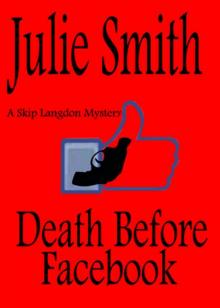 Death Before Facebook (Skip Langdon #4) (Skip Langdon Mystery) (The Skip Langdon Series)
Death Before Facebook (Skip Langdon #4) (Skip Langdon Mystery) (The Skip Langdon Series) P.I. On A Hot Tin Roof
P.I. On A Hot Tin Roof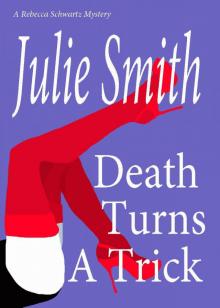 Death Turns A Trick (Rebecca Schwartz #1) (A Rebecca Schwartz Mystery) (The Rebecca Schwartz Series)
Death Turns A Trick (Rebecca Schwartz #1) (A Rebecca Schwartz Mystery) (The Rebecca Schwartz Series) The Axeman's Jazz (Skip Langdon Mystery Series #2) (The Skip Langdon Series)
The Axeman's Jazz (Skip Langdon Mystery Series #2) (The Skip Langdon Series)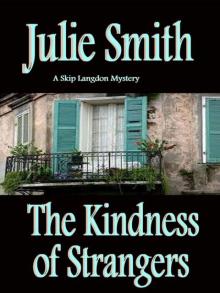 The Kindness of Strangers (Skip Langdon Mystery #6) (The Skip Langdon Series)
The Kindness of Strangers (Skip Langdon Mystery #6) (The Skip Langdon Series) Louisiana Hotshot
Louisiana Hotshot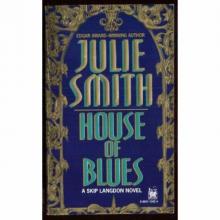 House of Blues
House of Blues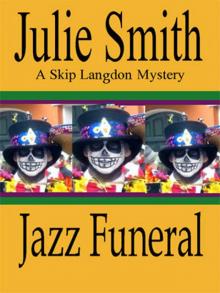 Jazz Funeral (Skip Langdon #3) (Skip Langdon Mystery) (The Skip Langdon Series)
Jazz Funeral (Skip Langdon #3) (Skip Langdon Mystery) (The Skip Langdon Series) Tourist Trap (Rebecca Schwartz #3) (A Rebecca Schwartz Mystery) (The Rebecca Schwartz Series)
Tourist Trap (Rebecca Schwartz #3) (A Rebecca Schwartz Mystery) (The Rebecca Schwartz Series)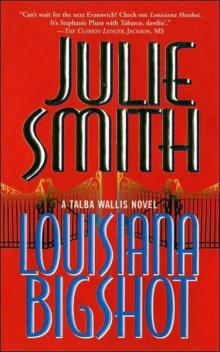 Louisiana Bigshot
Louisiana Bigshot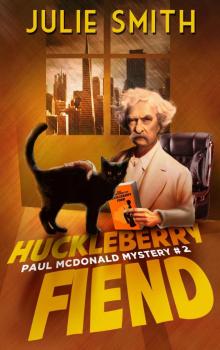 Huckleberry Fiend
Huckleberry Fiend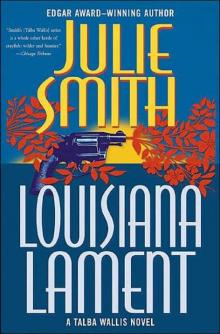 Louisiana Lament
Louisiana Lament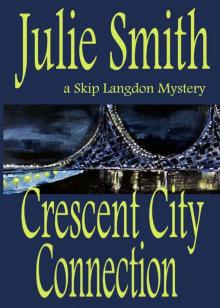 Crescent City Connection (Skip Langdon Mystery #7) (The Skip Langdon Series)
Crescent City Connection (Skip Langdon Mystery #7) (The Skip Langdon Series)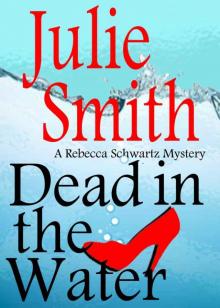 Dead In The Water (Rebecca Schwartz Mystery #4) (The Rebecca Schwartz Series)
Dead In The Water (Rebecca Schwartz Mystery #4) (The Rebecca Schwartz Series)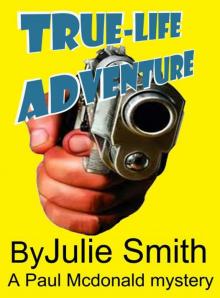 True-Life Adventure
True-Life Adventure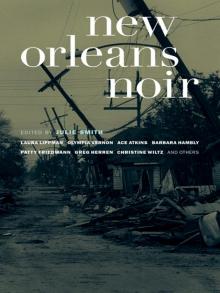 New Orleans Noir
New Orleans Noir